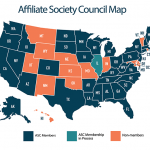Having served as the Affiliate Societies Council (ASC) member for New York for the past few years and participated in multiple ACR advocacy fly-ins, I have personally seen the benefits of being engaged in advocacy efforts for our organization. But we are currently facing more threats than ever, and to have any chance of future success we need engagement from all ACR members.
While the field of rheumatology has been privileged to see the arrival of highly effective therapies for crippling and life-altering rheumatic diseases, as well as advances in more sophisticated imaging and lab testing, we concurrently witness the erosion of our professional autonomy, uncertain financial stabilities of our practices, excessive burdens from federal mandates, including EHR Meaningful Use 2.0 (and 3.0 and 4.0, etc.), and the looming nightmares of ICD-10 and the value-based modifier—all of which threaten the very access of our patients to these monumental innovations. And no one is insulated from these perils—whether you are a solo doc, in a small group practice, in a multispecialty group or in academia.
In medical school, we were taught about the multifaceted roles of the physician—as diagnostician and clinician, scientist, educator, counselor and community leader. I would argue that in the current climate of medical practice, becoming an active and vocal advocate for our patients and our profession is an additional essential ethical obligation of a physician.
I recognize we all have competing interests for our limited time in terms of practice and institutional responsibilities, family life and personal time, which can pose a significant barrier to getting more involved. Therefore, I would like to suggest taking smaller and more manageable bites out of the problem:
- Identify a vocal patient who might assist in local and national advocacy efforts. Give yourself the task of looking at your patient panel once monthly, and try recruiting one patient to participate in the ACR advocacy fly-in this fall. It would be nice if you can join them, but that is not a necessity or a requirement. The voices of patients are powerful and help our advocacy efforts enormously.
- Make it a priority to visit your legislator in their local district office once yearly. When we do our fly-ins to D.C., there are times in which our “asks” achieve meaningful and measurable results. But the most important outcomes are the relationships that are fostered. To be called on as a resource for Congress when big healthcare decisions are being made is priceless. Fortunately, this process can begin in our own backyards with smaller efforts and little cost (i.e., missed time from practice to go to D.C.).
- Attend your state society meetings. Robust state societies are essential to the health of our organization. Because “all politics are local” and the individual state societies offer the most nimble ways to advocate at the local level, being a member of and attending society meetings are extremely important. Being connected to your state society also affords one an opportunity to voice important practice concerns and have your state society respond to these issues promptly.
If your state currently does not have a state society, it’s time to work with the ACR and ASC to help develop one. If you dislike your own state society, then it’s time to show up for meetings and make the necessary changes that would help make it the state society you want. For more information, contact ACR staff at [email protected].

